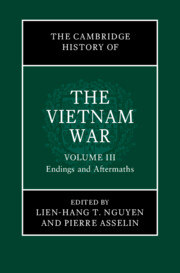Book contents
- The Cambridge History of the Vietnam War
- The Cambridge History of the Vietnam War
- The Cambridge History of the Vietnam War
- Copyright page
- Contents
- Figures
- Maps
- Contributors to Volume III
- General Introduction
- Introduction
- Part I The Late Vietnam War
- Part II The Postwar Era
- Part III Legacies
- 20 The Vietnam War and International Law
- 21 Environmental Legacies of the Vietnam War
- 22 The Vietnamese Diaspora
- 23 The Vietnam War in Vietnamese Official and Personal Memory
- 24 The Vietnam War in American Culture
- 25 The Specter of Vietnam
- 26 Vietnam’s Search for Its Place in the World
- Index
24 - The Vietnam War in American Culture
from Part III - Legacies
Published online by Cambridge University Press: 02 January 2025
- The Cambridge History of the Vietnam War
- The Cambridge History of the Vietnam War
- The Cambridge History of the Vietnam War
- Copyright page
- Contents
- Figures
- Maps
- Contributors to Volume III
- General Introduction
- Introduction
- Part I The Late Vietnam War
- Part II The Postwar Era
- Part III Legacies
- 20 The Vietnam War and International Law
- 21 Environmental Legacies of the Vietnam War
- 22 The Vietnamese Diaspora
- 23 The Vietnam War in Vietnamese Official and Personal Memory
- 24 The Vietnam War in American Culture
- 25 The Specter of Vietnam
- 26 Vietnam’s Search for Its Place in the World
- Index
Summary
In the 1980s and beyond, a variety of ways of thinking about the Vietnam War began to coalesce into conventional recollections: the received knowledge and common sense of the war. A truism was that Vietnam veterans had suffered a difficult homecoming worsened by their sense that they alone bore the war’s moral burdens. Aware of that predicament through the emerging understanding of post-traumatic stress, their fellow Americans felt obliged to offer Vietnam veterans the comfort of recognition. To overcome veterans’ isolation and bring together a divided public, the Vietnam Veterans Memorial acknowledged the service and sacrifices of those who had fought. Vietnam veterans became the principal vectors who overcame Cold War–generated divisions about the war, and brought it into public understanding through their testimony in oral histories and documentaries, literary works, and complaints about their grievances. Although opinion polls indicated throughout the decades that most Americans believed that their nation acted wrongly in Vietnam, a generational shift is now occurring as new cohorts grow up separated from the experience of the war by the span of years. As memories fall away through time, the Vietnam War becomes an artifact of American culture, of which everyone becomes the collective custodian and repository.
Keywords
- Type
- Chapter
- Information
- The Cambridge History of the Vietnam War , pp. 533 - 560Publisher: Cambridge University PressPrint publication year: 2024

